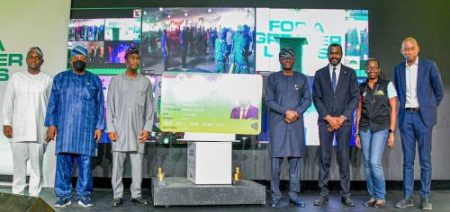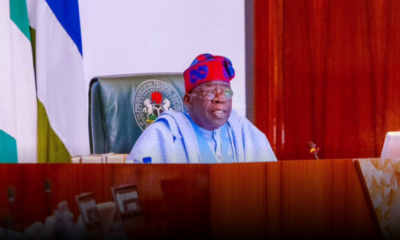…State Targets 10 Million Residents For Enrollment Before December
…‘Registration Is Free, Card Useful For 28 Services’ – LASRRA Boss
The move by the Lagos State Government to generate a comprehensive database of all persons residing in the State has moved a notch higher, with the launch of an upgraded and chip-embedded smart residency card by the Lagos State Residents Registration Agency (LASRRA), on Wednesday.
Governor Babajide Sanwo-Olu personally unveiled the smart residency card at launching events held simultaneously across five locations in the State. The locations include Ikeja, Lagos Island, Badagry, Ikorodu, and Epe.
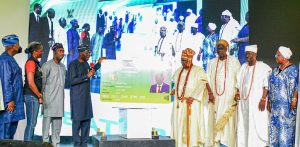
The new card offered a transition from an ordinary plastic card, meant only for identification purposes, to a smart, multi-purpose ID that combines biometric identification with other benefits, such as security, financial services, transportation, and access to government services and amenities.
Lagos started enrollment of its residents for residency registration in 2011 to create a reliable database to enable effective and realistic planning by the State Government, especially for the provision of social services and amenities.
Already, 6.5 million residents had been enrolled on the database by LASRRA, with the State witnessing a four-fold increment in registration in the last three years.
With the launch of the digitized card format, Sanwo-Olu said the State Government would be targeting to capture 10 million residents on the database before the end of the year.
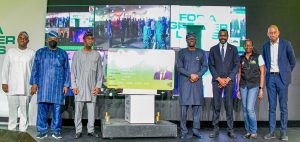
This new residency ID, according to LASRRA, is a multipurpose smart card with 28 applets that make the provision of 28 services possible to the cardholders.
The Governor said: “Today’s relaunch is borne out of the need to embrace change and align with global best practices. We have upgraded the residency card from an ordinary plastic card, for identification purposes only, to a smart, multi-purpose card that combines biometric identification with other functionalities and benefits, that cuts across areas such as security, financial services, mobility, and access to government services and amenities.
“Lagos experiences significant levels of daily inbound migration of people seeking economic opportunities and a better life. As a result, our population is rising rapidly, with obvious implications for social services, social infrastructure, and for security. It has become imperative for the State Government to re-examine strategies aimed at improving the security of lives and properties of the people.
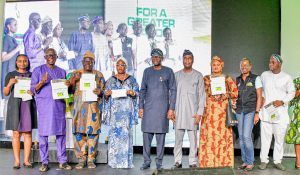
“This smart residency card being launched today will help us to address the issues surrounding the identification and traceability of Lagos residents, and ultimately help inform the Government’s planning and provision of services designed to secure lives and property. The card comes with an electronic wallet, which can hold funds and be used for daily transactions to support the cashless agenda of the monetary authorities.”
Sanwo-Olu said new visitors in Lagos who planned to live in the State for more than two consecutive months were now required to register for the residency card.
The Governor said Ministries, Departments, and Agencies (MDAs) would be leveraging the database to validate residents for the purpose of delivering essential services, including health insurance, pension administration, school allocation based on residential addresses, and other necessary social amenities.
Sanwo-Olu solicited the cooperation of all residents to register and acquire the card in order to enjoy the benefits on offer and to enable the Government to plan effectively and allocate budget for the delivery of good governance against the backdrop of the State’s growing population.
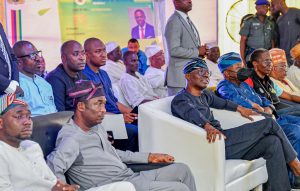
“The political will and commitment of this administration to ensure that we are delivering on our mandate effectively and efficiently has led to heavy and ongoing investment in Information Communication Technology (ICT) infrastructure on multiple fronts,” the Governor said.
Special Adviser to the Governor on Innovation and Technology, Olatunbosun Alake, said the launch of the smart residency card became another foundational layer on which the Government’s Smart City project would stand on, noting that the new card would also promote inclusion.
Explaining the details of the re-launched card, Alake said the registration procedure now came with elastic and expandable biometric interfaces to allow updates of information. He added that the card utilizes industry-standard security chips that prevent duplicated identities and profiles.
“We have a cloud redundancy system that allows 24 hours operations and a highly rated machine accuracy system. It has back-end cloud workload protection and two-factor authentication to make changes to the information originally supplied, such as a physical address,” Alake explained.
LASRRA General Manager, Engr. Ibilola Kasunmu, said the State could not afford to lag behind in the age of global digitalization, thereby making the transition to smart residency card compelling.
She said the agency was motivated by the resolve to contribute to the overall vision of the current administration by finding innovative ways to improve on the efficiency of governance and service delivery for the benefit of the people.
Kasunmu said: “We took account of certain limitations inherent in the initiative, developed an ecosystem framework with propositions to include a cost-effective approach to produce the smart ID cards for residents. We are glad to announce that we have been able to secure the partnership of several private sector players on this laudable project as we needed to ensure the card remained free to the residents of the State. Residents are not expected to pay for the card.”
In endorsing the new digitized ID format, Managing Director of Sterling Bank, Mr. Abubakar Suleiman, said Lagos remained the cradle of transformation.
The high point was the symbolic presentation of the smart residency cards to the Governor and residents freshly registered by LASRRA.

 BIG STORY3 days ago
BIG STORY3 days ago
 BIG STORY4 days ago
BIG STORY4 days ago
 BIG STORY3 days ago
BIG STORY3 days ago
 BIG STORY4 days ago
BIG STORY4 days ago
 BIG STORY4 days ago
BIG STORY4 days ago
 BIG STORY2 days ago
BIG STORY2 days ago
 BIG STORY1 day ago
BIG STORY1 day ago
 BIG STORY11 hours ago
BIG STORY11 hours ago




